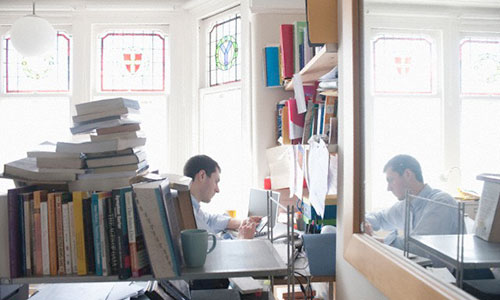 In
late February, Yahoo CEO Marissa Mayer made waves by changing her
company’s policy on telecommuting. Remote employees, reported Kara
Swisher of All Things D,
would soon be forced to work at the web giant’s headquarters. Inside
Yahoo, it was not a popular decision. In fact, an irked employee even
leaked an internal memo written by HR head Jackie Reses to Swisher.
“Speed and quality are often sacrificed when we work from home,” it
read. “We need to be one Yahoo, and that starts with physically being
together.”
In
late February, Yahoo CEO Marissa Mayer made waves by changing her
company’s policy on telecommuting. Remote employees, reported Kara
Swisher of All Things D,
would soon be forced to work at the web giant’s headquarters. Inside
Yahoo, it was not a popular decision. In fact, an irked employee even
leaked an internal memo written by HR head Jackie Reses to Swisher.
“Speed and quality are often sacrificed when we work from home,” it
read. “We need to be one Yahoo, and that starts with physically being
together.”
It’s an interesting theory. But I’m not sure that it holds water. Over the past few months, PhotoAssist has been adjusting to life without a physical home base. In late January, we moved from an office that we occupied for a decade into a virtual space. Save for special occasions, meetings are held by conference call. People sometimes meet to work in small groups, but most of us spend our days at home, at our desks or kitchen tables.
Even though I’d worked remotely a great deal in the months leading up to the switchover, it was still odd knowing that there was no longer a central hub at which we could congregate. And some days, you feel isolated. This may sound weird, but human interaction was something I took for granted. You miss it. That said, I’ve come to enjoy the freedom that working from home provides. As long as my coworkers know my availability—Google chat is a godsend—I can run out to a dentist appointment or go for a run in the afternoon. (One PhotoAssist colleague recently mentioned that he enjoys taking midday swims on a regular basis.) Am I more productive than I was when we had an office to report to? It’s difficult to calculate. But my overall morale has improved. After Mayer’s decree, Slate’s Farhad Manjoo wrote about his experiences working remotely:
“When I tell people that I work at home, they usually assume one of two things—that I’m un- or underemployed and just biding my time until I get a real job, or that I possess a monkish, single-minded devotion to work that they suggest is required for successful telecommuting. Neither is true. Instead, I’ve realized that, once you learn how to do it, working at home is superior in almost every way. It allows me to be better at my job and at my life—to be a more productive employee and a not-terrible husband and dad.”
Learning how to do it is the tricky part. Admittedly, I’m still trying to figure it out. Because I have more distractions at my fingertips, sometimes I let my days drag on longer than I should. Then again, the fact that I’m able to, say, go for a half-hour walk after lunch, is quite a perk. And I don’t have to worry about D.C. traffic, which according to a report by Texas A&M, is the worst in the country. In the end—despite Yahoo’s claim that “speed and quality are sacrificed”—the pros of working from home seem to outweigh the cons.
